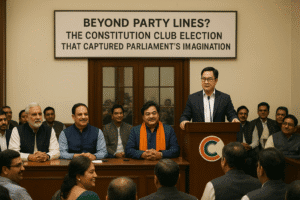Beyond Party Lines? The Constitution Club Election That Captured Parliament’s Imagination
A unique election within Parliament’s Constitution Club sparked surprising cross-party enthusiasm, prompting Union Minister Kiren Rijiju to declare it strictly “non-political” with no place for “party-baazi.” The contest for Club Secretary, featuring prominent figures, unexpectedly became a focal point. MPs across parties, including Trinamool’s Shatrughan Sinha and BJP’s Nishikant Dubey, expressed astonishment at the unprecedented energy and large turnout, unseen in decades.
Candidates like Sanjeev Baliyan emphasized the Club’s founding 1948 purpose: fostering discussion above party lines, insisting the result mattered less than preserving its “dignity” as a space for MPs and ex-MPs. The palpable excitement revealed a deep-seated, often unspoken, yearning among parliamentarians for neutral ground where shared identity as lawmakers could transcend political divisions. Rijiju’s statement served less as a description of reality and more as a powerful reaffirmation of the institution’s aspirational ideal of collegiality.
Ultimately, the election’s significance lay not in the winner, but in its rare demonstration of unifying parliamentary spirit and the enduring value of spaces dedicated to common ground.

Beyond Party Lines? The Constitution Club Election That Captured Parliament’s Imagination
The hallowed halls of India’s Parliament witnessed an unusual buzz on Tuesday, centered not on a contentious bill, but on an election within a unique institution: the Constitution Club of India (CCI). Union Minister Kiren Rijiju set the tone, declaring the polls for the Club’s Secretary “non-political,” asserting there was no place for “party-baazi” (party politicking) within its walls. This statement framed an election that, according to veteran MPs, generated unprecedented cross-party excitement.
More Than Just a Club: A Legacy of Bipartisanship
Established in 1948 for members of the Constituent Assembly, the CCI holds a special place in India’s democratic history. Its core mission, often overshadowed in today’s polarized climate, was to foster “social contact” and provide a space above party lines for parliamentarians – past and present – to engage in informal discussion and camaraderie. Headed by the Lok Sabha Speaker, its executive body includes sitting and former MPs.
The Election: Unusual Enthusiasm Breaks Out
The contest for Secretary featured prominent figures like former Union Ministers Sanjeev Kumar Baliyan and Rajiv Pratap Rudy. Yet, the most striking aspect wasn’t the candidates, but the fervor surrounding the vote itself.
- Baliyan’s Perspective: Emphasizing the club’s founding principle, Baliyan stated, “It was formed to have discussions by rising above party lines.” He downplayed the result’s importance, focusing instead on the club’s revived visibility: “Whatever the results, the dignity of this constitutional club remains intact… It is a good thing that this club is in the news again.”
- Cross-Party Energy: Trinamool Congress MP Shatrughan Sinha captured the surprise, noting, “I haven’t seen such excitement in any election so far, cutting across party lines.” This sentiment was echoed by BJP MP Nishikant Dubey, who claimed he hadn’t witnessed such a crowd at the Club in 25 years, seeing it as a sign of the institution’s “dignity returning.”
- High-Profile Participation: The significance was underscored by the participation of senior leaders like Union Home Minister Amit Shah, BJP President JP Nadda, and Union Minister Piyush Goyal, alongside numerous other MPs from various parties.
Rijiju’s Statement: Aspiration vs. Reality?
Minister Rijiju’s insistence on the election’s non-political nature sits intriguingly alongside the visible participation of active party politicians and the palpable excitement. It highlights the tension inherent in the CCI’s very existence:
- The Foundational Ideal: The Club was conceived as a sanctuary from partisan battles, a place for MPs to connect as colleagues beyond the din of politics.
- The Modern Reality: Inevitably, prominent political figures hold its positions, and elections, even internal ones, attract political attention and involvement.
Rijiju’s declaration, therefore, reads less as a description of absolute neutrality and more as a powerful reaffirmation of the Club’s founding ethos – a reminder of what it should strive to be, even amidst the unavoidable political identities of its members.
Why This Matters: The Value of Neutral Ground
The genuine enthusiasm witnessed on Tuesday – remarked upon by MPs across the spectrum – points to something deeper:
- Craving for Common Ground: The excitement suggests a latent desire among parliamentarians for spaces where constructive dialogue outside strict party mandates can occur.
- Institutional Dignity: Baliyan and Dubey’s emphasis on the Club’s “dignity” underscores its perceived value as a symbol of parliamentary unity and legacy, distinct from the daily political fray.
- A Litmus Test: Can an institution like the CCI truly maintain its non-partisan character in today’s hyper-polarized environment? The commitment expressed by participants to its founding principles offers a glimmer of hope.
The Insight: Beyond the Headline
The real story of the CCI election isn’t just who won the Secretary’s post. It’s the remarkable reaction it provoked:
- A Rare Unifier: In an era of deep divisions, an internal club election managed to generate bipartisan enthusiasm and participation, a phenomenon MPs themselves found noteworthy.
- Reaffirming First Principles: The event served as a public reminder of the CCI’s unique purpose – fostering collegiality beyond party politics – a principle championed by Rijiju and actively recalled by participants like Baliyan.
- The Enduring Need: The palpable energy suggests a profound, perhaps understated, need within Parliament for neutral spaces where the shared identity of being custodians of the Constitution can momentarily supersede party affiliation.
The Constitution Club election, declared “non-political” by a Union Minister, became a fascinating microcosm. It revealed a parliament momentarily united not by policy, but by a shared appreciation for an institution embodying an aspirational ideal – a space where the nation’s lawmakers can simply connect as colleagues, reminding themselves and the public of the common ground that underpins a functioning democracy. Its ability to sustain this ideal remains its true test.
You must be logged in to post a comment.